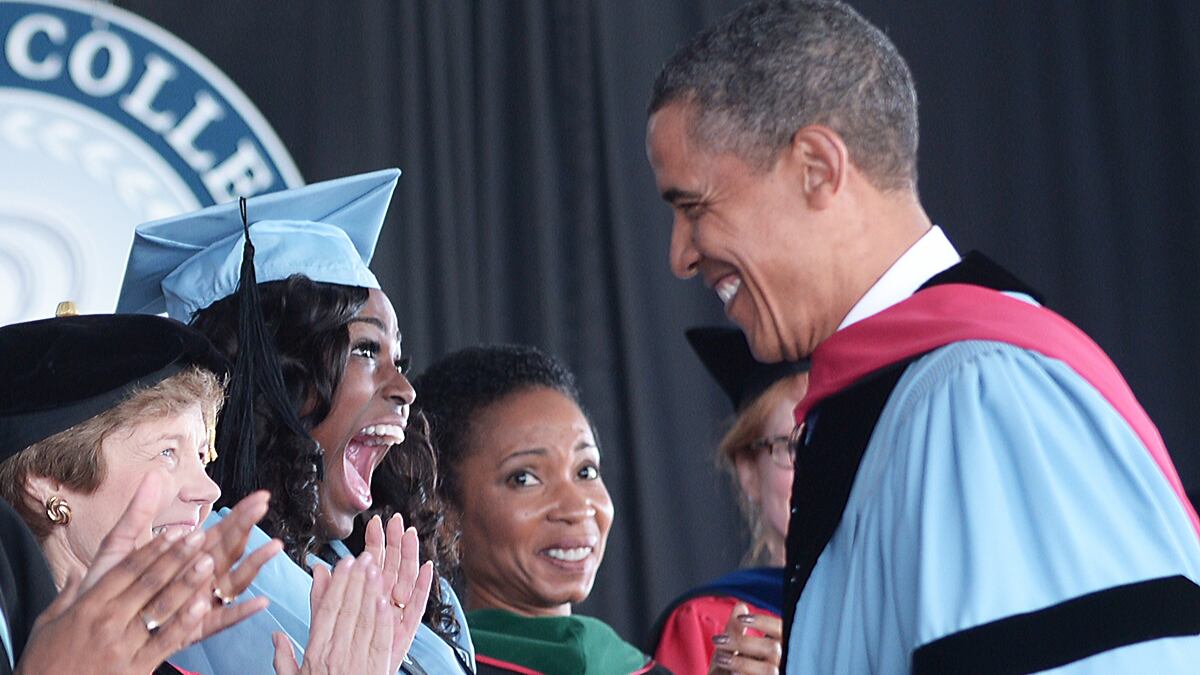
On Monday morning, President Barack Obama delivered what will be his sole college commencement speech in 2012 at Barnard College, the all-women's school affiliated with Columbia University in upper Manhattan. The President-who told the nearly 600 young graduates to “reach high and hope deeply"-seized the occasion to reaffirm his commitment to women's issues, a topic that has already dominated bipartisan debates this year and that will surely come into play come November. (Indeed, Obama's decision in March to speak at Barnard's commencement came just as the Democrats began to decry a GOP-led "War on Women".)
Obama-who referenced his mother, grandmother and wife as examples of strong, dedicated women-acknowledged that this year's graduates are heading into a tremendously uncertain economy, and noted that the country's young women face additional challenges right now: unequal pay, backsliding on reproductive rights, and few role models in the boardrooms of Fortune 500 companies or in the halls of Congress.
"We are better off when women are treated fairly and equally in every part of America, whether it's the salary you earn or the health decisions you make," Obama said. “We know these things to be true. We know that our challenges are eminently solvable. The question is whether together, we can muster the will -- in our own lives, in our common institutions, in our politics—to bring about the changes we need.”
But the most thunderous applause came when Obama invoked the word that defined his 2008 presidential campaign: hope. “Whenever you feel that creeping cynicism, whenever you hear those voices say you can’t make a difference, whenever somebody tells you to set your sights lower—the trajectory of this country should give you hope,” he told the crowd of some 7000 assembled guests, which included actress Cynthia Nixon and US Representative Charles Rangel. “Young folks who marched and mobilized and stood up and sat in, from Seneca Falls to Selma to Stonewall, didn’t just do it for themselves; they did it for other people. That’s how we achieved women’s rights. That's how we achieved voting rights. That's how we achieved workers’ rights. That's how we achieved gay rights. That’s how we’ve made this Union more perfect.”
Fittingly, Obama was accompanied onstage by Evan Wolfson, who received a Medal of Distinction for three decades of efforts to legalize gay marriage-an issue that Obama threw his support behind just last week. For Wolfson, it was, he told The Daily Beast after the ceremony, “the honor of a lifetime.”
“The opponents of gay peoples’ freedom to marry and participation in society in general are the same people who stand against women’s equality, women’s empowerment, women’s economic freedom,” Wolfson said. He contrasted the president’s reference to Stonewall and gay rights, which drew a huge surge of applause at Barnard, with reports that Mitt Romney’s commencement address at Virginia’s Liberty University on Sunday attacked same-sex marriage. “It’s not that marriage for gay people is the single most important thing in the country right now, but it does say something about the world view and values of where these two candidates want to take the country,” Wolfson said. “I think the more we end barriers based on gender, the easier it is to create a society that will treat everybody with respect, including gay people.”
The morning wasn’t all so earnest—Obama sprinkled his speech with plenty of moments of levity. When the president noted that he’d graduated from Columbia College in 1983, when students still used Walkmen and Moonwalked like Michael Jackson, a student in the crowd shouted for him to “Do it!” “No,” Obama laughed. “No moonwalking today.” Later, stressing the need for more women to enter male-dominated fields like computer science and engineering, Obama drew cheers when he delivered a message to the students from First Lady Michelle: "You can be stylish and powerful, too."
But the event was not without its share of controversy. Obama's appearance has created quite a scandal on the Morningside Heights campus, with Columbia College students expressing anger over the President's choice to speak at Barnard over his own alma mater. Tempers flared again in April, when it was announced that the School of General Studies' Class Day ceremony, also scheduled for Monday morning, was being moved to Sunday because of the heavy security measures surrounding Obama's visit to campus. Graduates of GS, the university's undergraduate school for adult education, complained that the university had waited too long to notify them of the change, and many family members couldn't adapt to the new graduation date.
Obama touched on the row in his comments, calling the controversy symptomatic of a little “sibling rivalry” between the schools. That may have been an understatement. The announcement that Obama would be speaking at Barnard’s commencement kicked up a nasty war of words between students on both sides of Broadway, with words like “feminazis” and “cum-dumpsters” lobbed like weapons at the women at Barnard.
Debora Spar, the College’s president, took on the issue more directly in her closing remarks, saying that amidst the ugliness, she saw reason for hope. “My optimism comes from the students—on both sides of Broadway—who organized themselves after the eruption of sexist comments earlier this semester, and who banded together to fight misogyny on campus and in the broader community,” she said.
The comments were a shocking dose of reality for graduating senior Marly Faherty. “What I really felt the most was that it was the first time in my life I felt my need to defend my place as a woman, here or in the world,” she told The Daily Beast at the time. “My generation has grown up not having to do that. It was scary as a realization to see that equality was still not there.”
For her, Spar’s remarks served as a reminder that the incident was “something we shouldn’t forget, but not something we need to dwell upon.” It spoke also, she said, of “the ability of Barnard to rise up, and band together, and go forward from here, while being aware of that in the world.”
That lesson—perseverance despite obstacles that may seem insurmountable—was exactly the message that Obama sought to impart. “After decades of slow, steady, extraordinary progress, you are now poised to make this the century where women shape not only their own destiny but the destiny of this nation and of this world,” he told graduates. “But how far your leadership takes this country, how far it takes this world—well, that will be up to you. You’ve got to want it.”





